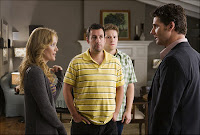Not So Far Out
 In the new movie Taking Woodstock, we get to see some of the behind-the-scenes stuff that resulted in one of the most famous concerts of all time. The legend of Woodstock (which happened 40 years ago this summer) is, of course, a large one. Pity, then, that this movie doesn't really come close to generating the same level of excitement that you'd hope it would. Granted, the lack of a typical soundtrack is a nice departure — no sign of Crosby, Stills & Nash's "Woodstock," Jimi Hendrix's "Star Spangled Banner," or other relevant tunes on the soundtrack — but by leaving off those recognizable touchpoints, Taking Woodstock doesn't, ahem, get very high.
In the new movie Taking Woodstock, we get to see some of the behind-the-scenes stuff that resulted in one of the most famous concerts of all time. The legend of Woodstock (which happened 40 years ago this summer) is, of course, a large one. Pity, then, that this movie doesn't really come close to generating the same level of excitement that you'd hope it would. Granted, the lack of a typical soundtrack is a nice departure — no sign of Crosby, Stills & Nash's "Woodstock," Jimi Hendrix's "Star Spangled Banner," or other relevant tunes on the soundtrack — but by leaving off those recognizable touchpoints, Taking Woodstock doesn't, ahem, get very high.Set in the summer of 1969, the film tells the true story of Elliot Tiber (Demetri Martin), whose parents owned and managed a run-down motel in White Lake, NY. When Tiber hears of a "hippie festival" that needs a home, he offers its organizers accommodations and puts them in touch with a friend, Max Yasgur (Eugene Levy), who has a field that would be perfect. The rest, as they say, is history.
 You might assume that any film about Woodstock would be overly cliche because of the stereotypes now associated with it — the music, the attendees, the scenes so well documented, etc. Well, as noted, there's not even a hint of the music you'd expect on the soundtrack. Richie Havens is heard softly in the distance, and an updated version of his "Freedom" comes on over the end credits if you stay long enough. And sure, there's a lot of peace, love, and drugs, but the film is not as concerned with the concert as much as it is with how it came to be — and with the liberating effect it had on Tiber. That's sort of a shame, because Taking Woodstock could have used some more of that fun. As it is, Martin and Levy, two very funny people, are left to be very serious and dull, and the chuckles come from Michael Lang (Jonathan Groff, from Broadway's Spring Awakening), for example, not because he's a funny character, but because he's such a recognizable figure and it's amusing to see him on screen.
You might assume that any film about Woodstock would be overly cliche because of the stereotypes now associated with it — the music, the attendees, the scenes so well documented, etc. Well, as noted, there's not even a hint of the music you'd expect on the soundtrack. Richie Havens is heard softly in the distance, and an updated version of his "Freedom" comes on over the end credits if you stay long enough. And sure, there's a lot of peace, love, and drugs, but the film is not as concerned with the concert as much as it is with how it came to be — and with the liberating effect it had on Tiber. That's sort of a shame, because Taking Woodstock could have used some more of that fun. As it is, Martin and Levy, two very funny people, are left to be very serious and dull, and the chuckles come from Michael Lang (Jonathan Groff, from Broadway's Spring Awakening), for example, not because he's a funny character, but because he's such a recognizable figure and it's amusing to see him on screen. On the good side, I liked Liev Schreiber's very natural performance as Vilma, a transvestite Marines vet who offers Elliot and his family protection. It could have been a very gimmicky performance, seeing this very masculine guy in a dress, but Schreiber plays it totally, ahem, straight, and it just works. The film itself does not, however. It's too long, too dull, and is not a must-see, since it really fails to capture the excitement of the concert and the surrounding events. Instead, check out the new 40th anniversary edition of the Woodstock movie. As for Taking Woodstock? I'm giving it a C.


























